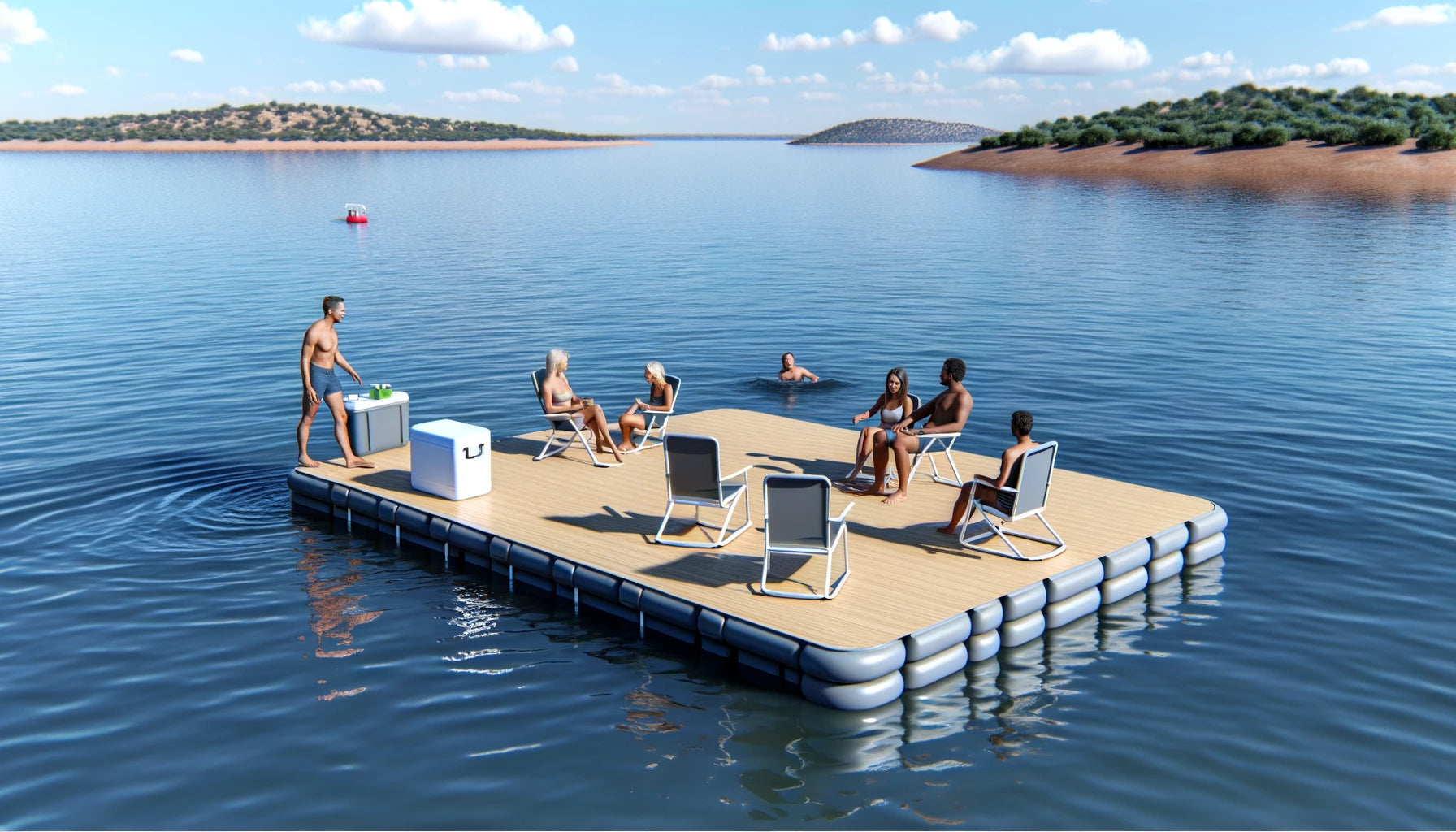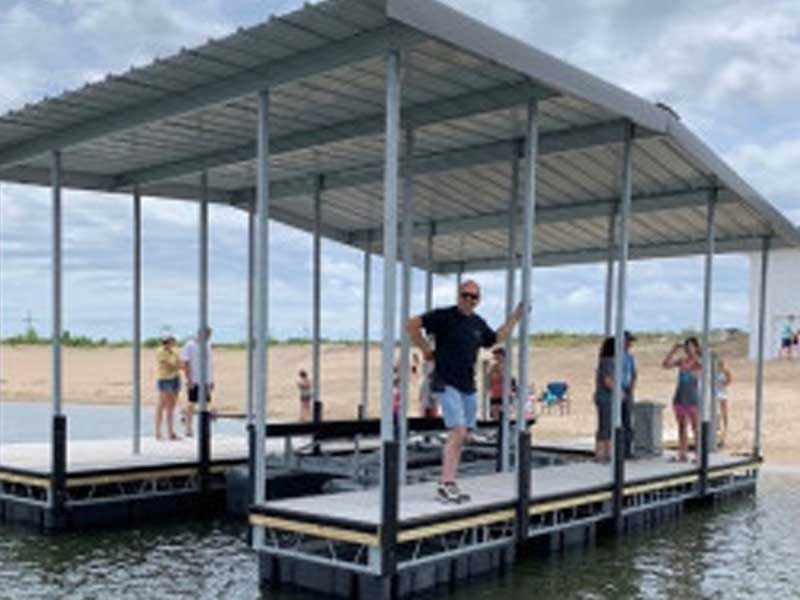Why Floating Docks Are the Perfect Service for Your Waterside Demands
Floating docks present an engaging solution for waterside needs, specifically due to their adaptability to rising and fall water levels and their durable, modular design. As we check out the diverse advantages and applications of floating docks, it ends up being noticeable why they stand out in the world of beachfront framework-- particularly when taking into consideration the lasting benefits they provide for various stakeholders.
Trick Benefits of Floating Docks
The versatility of floating docks offers numerous advantages for waterside applications, making them an increasingly preferred selection among marina operators and property programmers. Among the key benefits is their adaptability to varying water degrees, which allows them to continue to be practical in various environments, consisting of lakes, rivers, and coastal locations. Unlike conventional fixed docks, floating docks can climb and drop with the tides and seasonal changes, making certain regular accessibility.
Additionally, floating docks are typically less complicated and much less costly to maintain and set up. Their modular layout helps with quick assembly, reducing labor costs and building time. Furthermore, the materials used in floating dock building and construction are often resistant to rust, making certain long life with minimal maintenance.
Safety is one more essential advantage; the buoyant nature of these docks reduces the risk of mishaps throughout getting off and boarding, making them particularly appealing for family-oriented centers. Last but not least, their ecological impact is reduced than that of fixed frameworks, as they do not disrupt water communities. Collectively, these benefits setting floating docks as a premium option for a variety of beachfront requirements, straightening with both operational effectiveness and environmental considerations.
Suitable Applications for Various Tasks
Versatility is a characteristic of floating docks, making them ideal for a variety of activities throughout different beachfront setups. These flexible frameworks can act as ideal platforms for leisure tasks such as boating, angling, and swimming. Their buoyant nature permits very easy accessibility to watercraft, allowing smooth embarkation and disembarkation, while also giving a steady area for fishermens to cast their lines.
In commercial settings, floating docks help with the loading and unloading of products, fitting both large and small vessels. They are especially useful in locations with ever-changing water levels, ensuring that operations stay undisturbed. Additionally, floating docks can be utilized for waterside eating and amusement, providing a one-of-a-kind and breathtaking experience for clients.
Ecological applications are likewise noteworthy; floating docks can work as monitoring platforms for wild animals viewing or as docking terminals for study vessels taken part in ecological researches. As marina expansions become a lot more prevalent, these docks supply a functional service for enhancing capability without considerable land changes. Inevitably, the convenience of floating docks makes them a favored choice for anyone looking for efficient and useful waterside services.
Layout and Modification Choices
Floating docks not only satisfy varied activities yet likewise offer a variety of style and customization alternatives that improve their functionality and visual charm. These versatile frameworks can be tailored to fit specific waterfront needs, whether for residential, business, or entertainment objectives.
One trick facet of modification is the selection of products. Options range from high-density polyethylene to light weight aluminum, each providing distinct benefits in regards to sturdiness and maintenance. In addition, the arrangement of the dock can be adapted to suit various water levels and ecological conditions, making certain security and safety.
Design functions can include incorporated seats, barriers, and lights, which not only improve use yet likewise boost the appearance of the dock. Customized colors and finishes permit owners to match the dock with existing structures or personal preferences, creating a cohesive seek the beachfront.
In addition, floating docks can be designed with modular sections, enabling easy growth or reconfiguration as demands alter. This adaptability is especially beneficial for growing families or advancing business. On the whole, the comprehensive design and modification options available make floating docks a highly versatile solution for any beachfront setup.
Setup and Maintenance Considerations
Normally, successful setup and maintenance of floating docks require careful preparation and attention to information. Before starting installment, it is important to evaluate the particular website conditions, including water deepness, wave action, and neighborhood go now laws. This first assessment educates the option of products and layout, making sure the dock will hold up against environmental anxieties.

Upkeep is similarly important to extend the life expectancy of the dock. Routine assessments should be performed to recognize wear and tear, specifically on flotation devices, ports, and decking. Cleaning up the dock periodically aids avoid the build-up of algae and debris, which can compromise surface integrity and appearances.
In addition, seasonal prep work, such as removing accessories and safeguarding the dock throughout extreme climate, can stop damages. By focusing on appropriate installation and routine maintenance, proprietors can guarantee their floating dock continues to be a trustworthy and practical waterside option for many years to find.

Environmental Impact and Sustainability
The ecological effect of floating docks is an essential consideration for beachfront projects, as these structures engage directly with marine ecological communities. dock company. Unlike typical fixed docks, floating docks reduce interruption to the substratum, enabling natural sediment activity and decreasing disintegration. Their layout permits water flow her explanation under, promoting healthy and balanced water environments and supporting local wild animals
Lots of floating docks are constructed from lasting products, such as green compounds and recycled plastics, which decrease the carbon impact connected with manufacturing. Furthermore, modern styles integrate attributes that boost ecological sustainability, such as permeable surfaces that facilitate water purification and decrease pollution.
Floating docks also give a perfect platform for environment repair by sustaining the development of water plant life and offering sanctuary for fish and various other aquatic microorganisms. By consisting of functions like fish environments and submerged plantings, floating docks can improve biodiversity in the location.
In enhancement, these frameworks can be designed top article to fit solar panels, supplying eco-friendly power choices that even more lower their ecological effect (floating dock company). In general, floating docks stand for a sustainable service that stabilizes human usage of waterfronts with the preservation of important communities
Final Thought
In conclusion, floating docks existing a highly versatile and sustainable solution for varied waterside demands. Their modular style, paired with the use of durable, corrosion-resistant products, guarantees long life and convenience of maintenance. The flexibility of floating docks accommodates various applications, varying from recreational activities to industrial operations while reducing ecological impact. Ultimately, the personalized attributes and capacity for expansion more solidify floating docks as a perfect selection for any kind of waterfront task.
Floating docks present an engaging service for beachfront requirements, particularly due to their adaptability to fluctuating water levels and their robust, modular style. Unlike conventional fixed docks, floating docks can climb and fall with the tides and seasonal adjustments, making sure constant access.
Jointly, these benefits placement floating docks as a premium solution for an array of beachfront needs, aligning with both operational effectiveness and eco-friendly factors to consider.
On the whole, the substantial design and personalization options readily available make floating docks an extremely adaptable service for any kind of beachfront setup.
Unlike conventional set docks, floating docks lessen disruption to the substrate, allowing for natural sediment motion and decreasing erosion.